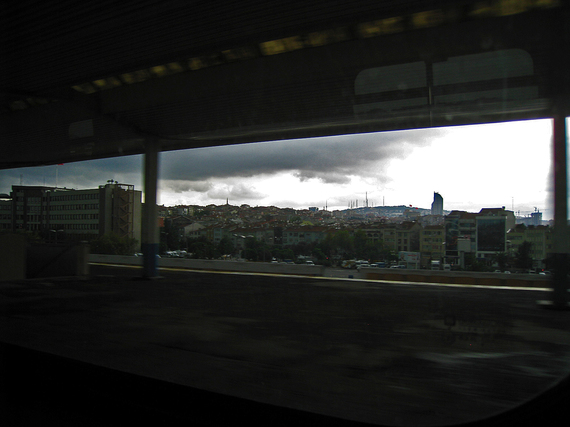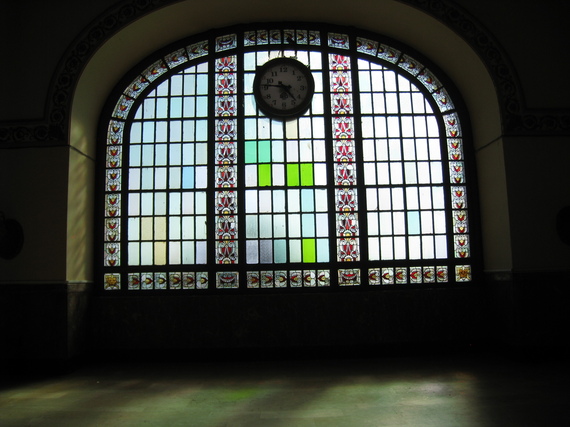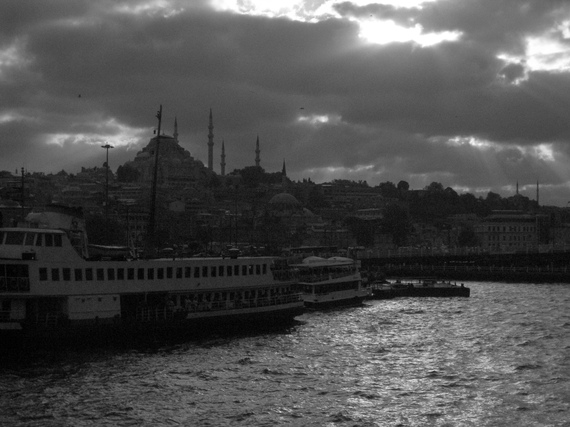(The following is the first part of a three-part fictitious short story.)
The train rumbled out of the station as Kiera pushed past the turnstile. The low mists of the night before were gone, chased out to sea by the sun.
A man approached the bench under the olive tree where Kiera sat waiting for the next train. His face was pocked with scars from the pimples he'd dug out with his grandmother's clothespin as a teenager. An uneven bowl cut framed his scarred face, giving him the air of a 52-year-old boy whose mother had left him for good at this train station decades ago.
He showed Kiera a haggard piece of cardboard, explaining in broken Turkish each of the wares dangling from his mobile cardboard display. The bestsellers, he claimed, were this new brand of gum and a pocket lighter so reliable it could light a cigarette on the deck of a ferry sailing back and forth between Europe and Asia. The lynchpin of his pitch remained unspoken: the gum tasted like a cross between Nicorette and a wet grave and not a single one of the lighters he'd ever sold contained a lick of fuel.
Hoping to make him go away, Kiera bought a pack of gum, regretting it instantly after she popped a piece in her mouth and felt it softening between her teeth. Within seconds it began to cement, slipping on the surface of her tongue like a broken tooth. The one-man bazaar was still standing in front of her, half a foot closer now, waiting for her reaction.
"Teşekkürler," Kiera said as the next train began to vibrate in the concrete bench, meaning "Thanks." Given the circumstances and the fourth-rate Turkish she'd learned two nights a week in the basement of a Kebab shop in Queens, it was all she could manage.
"Evet," he said, meaning "Yes," but Kiera was already hovering over the edge of the platform before he could get off another lonely word.
Kiera chose an empty window seat facing the sea. The train shook violently as it gathered strength and set off. Unable to talk her nerves down off the ledge, Kiera focused on the view whistling past. It was surreal. She was actually here. She was riding a train in the city that had filled her mind every day for the last five years; the city she believed would enable her to become a writer with something worth saying; the city that had nourished her father's wounded cosmopolitanism; the city where he'd gone missing three years ago; the city for which she'd left a career, a boyfriend, and an apartment in Manhattan to come and discover whatever traces he might've left behind: Istanbul.
Having arrived fewer than 24 hours ago, the name still felt hot to the touch, not unlike the metal of the chair gripped in her hands as the train lunged into the next station. Stifling air rushed in through half-open windows. As much as she wanted to watch the sea, she couldn't stop staring at the prefabricated concrete apartment blocks built haphazardly along the other side of the train tracks. The sprawl grew increasingly dense as they neared the end of Asia: minarets, motorbikes, and sun-washed beige and peach concrete towers caught in the wave of breakneck urbanization still crashing on Istanbul's shores.
Kiera had to stop, breathe deep, and fight back the sense of dread pressing against her ribs. It was the price she paid for thinking longer than 15 seconds about finding an agent for her first novel, Pinochet's Bastards.
She'd finished the book a year after graduating from NYU. In the four years that had passed since the last time she'd clicked "File" and "Save As" with a mixture of relief and elation, her query letters had been ignored, deleted, or rejected by 197 literary agents in New York, London, San Francisco, and Connecticut. The first sentence of the book had come to her on the way home from high school in West Oakland when she was 15 years old; of course, the initial draft she completed before graduating from McClymonds High was a remote relative of the book she would finish nearly a decade later, the sediment of plot and characters from each subsequent draft buried too deep for anyone other than Kiera to ever be the wiser.
Pinochet's Bastards had begun as an autobiographical bildungsroman of a young Japanese-Turkish-American woman born and raised a block away from the West Oakland street where Huey Newton was shot three times in the head in 1989. She started writing the book, in part, because she wanted to understand what those hyphens preceding the word "woman" meant.
A month before she graduated from high school, she showed a 150-page first draft to her senior AP English teacher. "You have a voice, love. A fierce, beautiful, original voice," Mrs. Johnson told her two weeks later after returning the carefully bound folio of the manuscript, not a few pages of which bore the stiff, brittle watermark of the tears she'd shed reading her favorite student's novel. "I love it. I wasn't always sure about the meaning you were trying to convey, but I love it."
How do you explain to someone when you are only 18 years old that you want to give voice to the ash and ghosts of Hiroshima, the docks and minarets of Istanbul, the bop and Knowledge of West Oakland? That, beyond just getting your book on the identical shelves of Barnes and Noble, your ambition is to rewrite America? Seven years, eleven months, and four drafts later, that short, personal tale--in which Kiera had worked in miniature, refusing to pan the camera away from the eight square blocks in West Oakland that defined the protagonist's existence--had evolved into a sprawling, multi-generational social novel set in Santiago, Chile, inspired by Camila Vallejo and the student uprising she'd helped lead.
"You're writing is very good. Your use of figurative language, in particular, deserves praise. However, I just didn't "love" Pinochet's Bastards the way I need to in order to represent a project at a time when the market continues to contract."
That's what the first agent who took the time to read Pinochet's Bastards wrote to her three months after Kiera had emailed the manuscript to her in a feverish state of joy and anxiety. When she read this email on her laptop while sitting in the back of Blue Bottle Coffee on Berry St. in Brooklyn, she took it in stride. She thought about Joyce and ran down the list of her other literary heroes whose work had also encountered a depressing degree of indifference from literary gatekeepers considering the contractions of the market from their offices overlooking Manhattan.
A man entered her train compartment and began crawling down the aisle, collecting change in the hollow of a prosthetic leg he'd detached for theatrical effect.
"My friends!" he boomed in stentorian Turkish. "I've lost my leg in a horrible accident! God willing, you'll help me today by parting with whatever coins might be overcrowding your pockets!"
Kiera was already too far gone in her thoughts to give herself over to the man's performance. She couldn't stop revisiting the thought that the agent she'd emailed from the lounge at JFK airport two days ago seemed, well, different. For one, she wasn't white like the remaining 99% of the agents Kiera had read about online or met at a literary conference. More importantly, however, the agent Kiera was trying not to think about as she hopped off the train at the Haydarpaşa Terminal knew her job like few others. She did not represent many books. Those she did stick her neck out for broke the sound barrier nearly every time. Three National Book Awards, five Pulitzers, and two authors shortlisted for the Nobel; nearly every title she represented was urgent, necessary, and brimming with blood and risk.
Kiera was too overwhelmed by the rush of bodies to admire the station's architecture.
As she gripped her purse to her side and wove through the ever-shifting mosaic of Turkish, Roman, Mongolian, Arabic, and Cossack faces, the unwelcome intimacy of the heat was beginning to unravel her determination to meet her uncle on the European side of the city. She stepped to the right of the current in the lobby, stopping to observe a small camera crew filming break dancers in the middle of a staged battle. Although she wouldn't realize it until several months later, they were shooting a commercial for the same rancid gum the 52-year-old boy had creepy-faced her into buying.
After exiting the train station, Kiera queued up at the tail end of a loopy accordion-shaped line waiting to board the commuter ferry that had just docked. Two members of the crew flung down a narrow metal platform from the deck, but before it whacked against the concrete and settled into place, a few brave souls jumped across the three-foot gap between the ferry and the gangplank. An Australian tourist chuckled, leaning in toward Kiera as if to confide a secret.
"Guess that's how you know who the locals are," the man said with visible delight in his own powers of discernment.
The midafternoon sun burned high above the mosques of the Golden Horn. For Christ's sake, even Zadie Smith read the first three chapters and said she enjoyed them, Kiera thought. It was true: Zadie had read the first three chapters. While a senior at NYU, one of Kiera's professors read the opening pages of Pinochet's Bastards and passed them on to Zadie who read them over lunch the next day. However, she never sent those pages on to her agent, making Kiera wonder if she was just being polite and the quick note she'd sent back to Kiera's professor-- "Brilliant start"--was the British way of saying something was interesting.
A family of five was taking turns throwing pieces of their lunch at the seagulls hovering alongside the ferry, the mother holding on to the scruff of whatever child happened to be hefting her bread into the wind. Just a bit farther down the deck, Turkish teenagers smoked cigarettes, lean bodies pressed self-consciously against the ledge as they began singing a song that could make a lifer blush. As they reached the chorus of a filthy ditty about goats, horny villagers from Anatolia, and their archrivals from the Fenerbahçe soccer club, the mother tried in vain to cup all eight ears while herding her flock below deck. The seagulls were not in the least deterred by the temporary loss of their lunch to piety. The troupe of wind-drunk acrobats noticed a man hiding behind his Nikon D3200 near the middle of the upper deck. Sensing an opportunity, they drifted backwards until they were soaring parallel to the photographer. An unspoken pact was brokered, and seconds later the man was tearing off generous chunks of his sandwich and lobbing it into the birds' greedy mouths.
Kiera leaned over the railing. Contemplating the unsteady blue-white-grey glow of the Bosporus caused old anxieties to kiss the surface. For a moment, the world seemed to lose its color. It was unsettling, like a black and white film of the Istanbul of her childhood dreams and fears.
She shut her eyes, felt the wind against her soft cheeks, and let a few deep breaths join that ancient wind. When left alone with her thoughts, Kiera often anguished over a lifelong suspicion that she was searching for something that always took three steps into the distance for every two she put behind her. Unlike her older sister Kumiko, semi-professional Instagram model, ride or die hood chick, fleeting-pleasure pursuer, Kiera had never been able to outrun loneliness. It was always there, waiting for her. She used to think it was something that lurked around corners and entered your body, something contagious like a virus or a destructive idea. New York City taught her otherwise. The four years she spent at NYU and the subsequent three she spent as an editorial assistant at Farrar, Straus, and Giroux, beyond stoking the ache of her desire for literary renown, showed her that loneliness was not an invasive force she could guard against by widening the moat around her heart.
To be continued...


